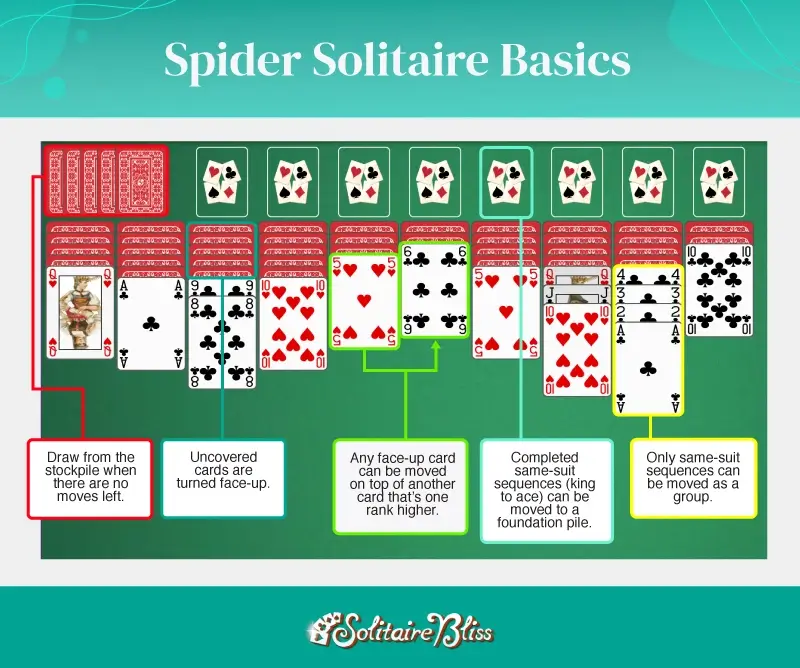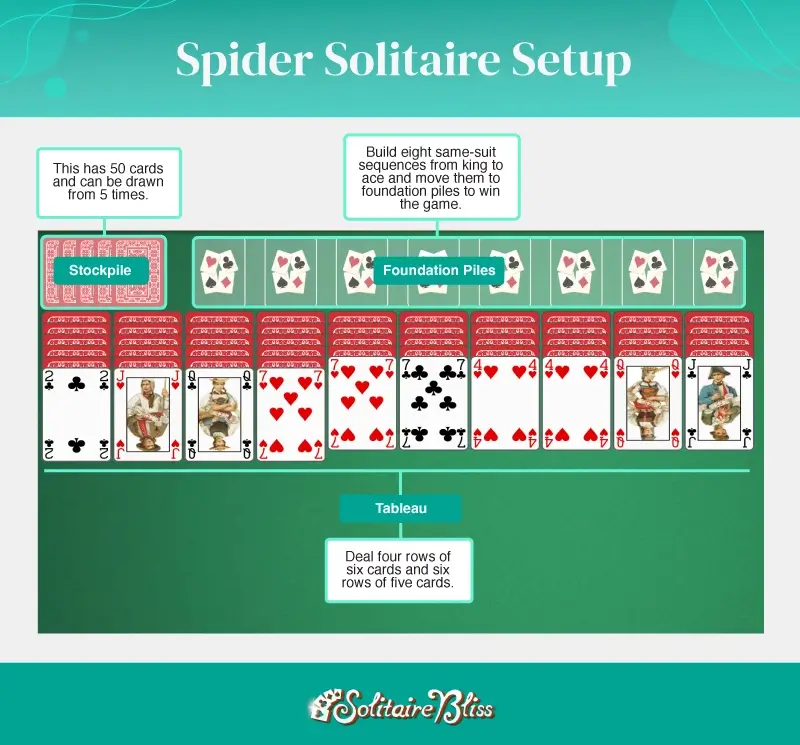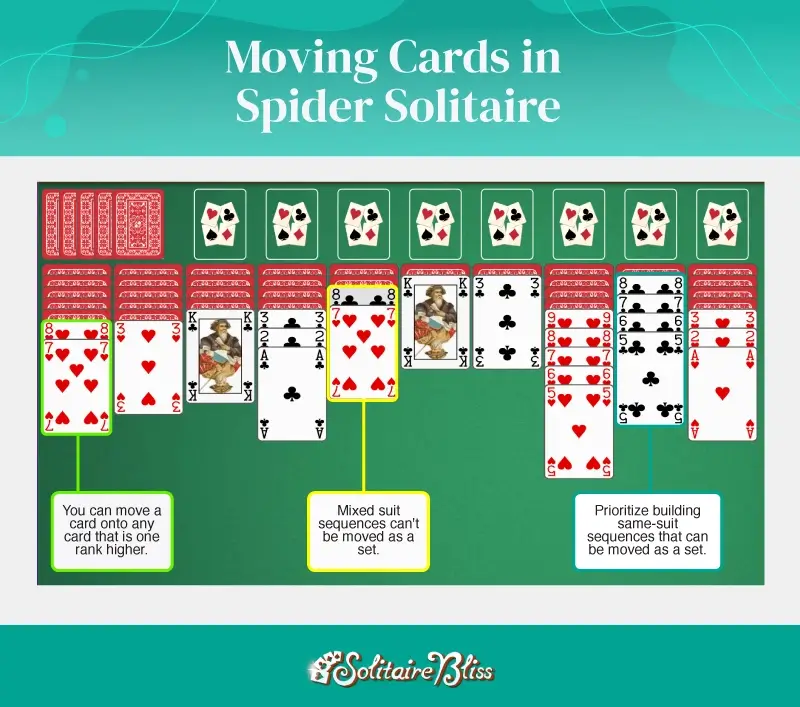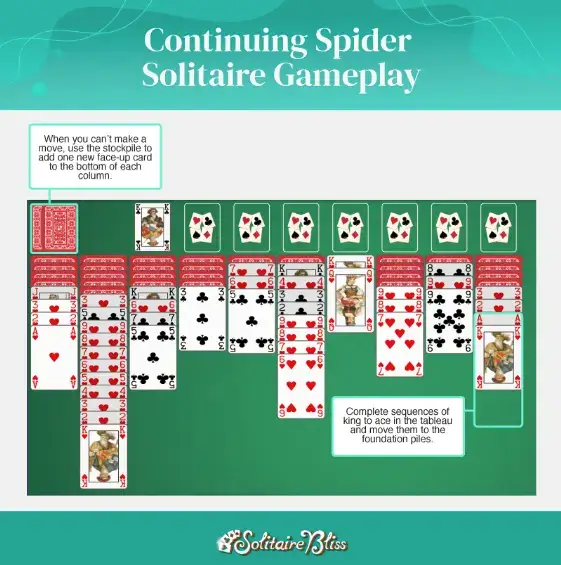How to Play Spider Solitaire: Rules & Winning Strategies
Spider Solitaire is a variant of the traditional Solitaire card game. Just like regular Solitaire, you'll make sequences on the tableau and move cards to the foundation piles. However, Spider Solitaire has some differences compared to Klondike Solitaire. Most importantly, you can only move a set of cards to its foundation pile once you've built a complete same-suit sequence (king to ace) within the tableau. And since you play this game with two decks of cards, you have to build eight sequences, just like the eight legs of a spider.
If you're a beginner, start by playing the easiest 1 Suit version. As you progress, challenge yourself with more difficult 2 Suit or 4 Suit Spider Solitaire variations.
Spider Solitaire Objective
The object of the game is to complete same-suit sequences descending from king to ace and move them to the foundation piles. You can't move sequences into the foundation piles until the entire sequence is complete. Once you complete all eight sequences and clear the tableau, you win the game.
Solitaire Quick Start Rules
- Any face-up card on the tableau can be moved on top of another card that's one rank higher.
- Uncovered cards are turned face up.
- Only same-suit sequences can be moved as a group.
- Any face-up card or sequence can fill an empty column.
- When no further moves are possible, use the stockpile to add one new face-up card to the bottom of each column.
- When a complete same-suit sequence is built (king to ace), it can be moved to a foundation pile.

How to Set Up Spider Solitaire
To set up the Spider Solitaire game, you need 104 playing cards total with 54 cards in the tableau and 50 in the stockpile.
- Set up the tableau. Deal four columns of six cards each with the last card of each column face up. Then deal six columns of five cards with the last card face up. These ten columns are called the tableau. You will use the tableau to sequence cards.
- Create your stockpile. Place the remaining 50 cards facedown to the top right of the tableau. This is called the stockpile.
- Designate an area for your foundation piles. Leave space for eight foundation piles at the top right of the tableau.

Playing Solitaire Variations with Standard Cards
In the online version of Spider Solitaire, the 1 Suit game uses cards of the same suit. However, it requires eight decks to replicate this exactly with real cards (so that you have eight sets of a single suit, such as spades).
To make setting up and playing the game simple, you can use two standard decks of cards instead and keep the following in mind:
- 1 Suit: Sequence any cards in descending order regardless of suit. Essentially, you're imagining that all cards are the same suit.
- 2 Suit: Sequence cards in descending order by color so that the two suits are simply colors. Reds are paired with reds and blacks are paired with blacks.
- 4 Suit: Because you're using four suits, the game rules for this version are the same as playing online. Sequence cards by suit from king to ace to move them from the tableau to their foundation piles.
How to Play Spider Solitaire with Examples
Here are some examples of general moves you should keep in mind while playing Spider Solitaire to avoid getting stuck and help win the game.
1. Build Descending Sequences in the Tableau
To play Spider Solitaire, you'll need to build sequences descending from king to ace on the tableau. You can do this by placing a card on another face-up card that is one rank higher. For example, you can place a jack on top of a queen. When you move the jack, you can then reveal the next card that was underneath it. Keep in mind, however, that only same-suit sequences can be moved on the tableau and moved into foundation piles.
When you play 1 Suit Spider Solitaire, all of the cards will be the same suit and you just need to move the face-up cards into descending order. However, if you're playing 2 Suit or 4 Suit Spider Solitaire, you can temporarily make sequences with mixed suits. However, you will eventually need to reorganize cards into same-suit sequences since that's the way to win.

2. Draw from the Stockpile When You Can't Make a Move
You should save using the stockpile for emergencies and only deal cards from it once you run out of moves to make. When you use the stockpile, ten cards are dealt to the bottom of each of the ten columns. This means you risk getting stuck since you might cover a card you need with a card from the stockpile. Also, remember that since the stockpile only has 50 cards, you can only use it five times during the game.
If you do get stuck, the stockpile can be a good way to rejuvenate the tableau. By adding ten stock cards to the bottom of the columns, you have ten more chances to use those cards to create sequences. However, once you run out of the stockpile and have no more available moves, you will lose the game.

3. Move Completed Sequences to the Foundation Piles
Once you've built a same-suit sequence from king to ace, you can move the cards up to a foundation pile. If you're playing online, the cards will automatically move for you. To win the game, you must move all eight sequences up to the foundation piles, regardless of what Spider Solitaire variation you're playing.
Spider Solitaire Strategies and Tips
Spider Solitaire's rules are easy to follow, but winning the game can be difficult. The following strategies and tips can help you avoid getting stuck, especially if you're playing with multiple suits.
- Prioritize building on higher-ranking cards. This is particularly important in 2 Suit and 4 Suit variations where you can make mixed-suit sequences, but can only move same-suit sequences. Building on higher cards first can help you make more moves and reveal facedown cards.
- Reveal as many facedown cards as possible. Revealing facedown cards increases your move options and helps you access the cards you need to complete sequences. This is why building mixed-suit sequences in the 2-suit and 4-suit variations is so helpful, as you'll be able to flip up more facedown cards on the tableau.
- Try to empty columns. Any card or sequence of cards can be moved to an empty column. This empty space helps you free blocked cards or rearrange the tableau, furthering gameplay.
- Use the stockpile sparingly. While it can be tempting to draw new cards when you're stuck, make sure to assess the board and evaluate all your options before dealing with new cards. You can only use the stockpile five times and if you run out of stockpile cards and can't make more moves, you lose the game.
- Use the undo button if needed. If you see a better move or get stuck and want to rework the tableau, use the undo button. If you're playing with physical cards, feel free to redo your moves. This may ultimately help you win the game.
Play Spider Solitaire for Free on Solitaire Bliss
If you're looking to upgrade from your classic Solitaire game, try Spider Solitaire on Solitaire Bliss. The game is automatically set up for you, so you don't have to worry about keeping track of cards. You can even play for free without having to log in. And, if you want to advance even further, you can play other Solitaire card games like Scorpion, Spiderette, and Easthaven all on Solitaire Bliss.
Back to the Homepage

